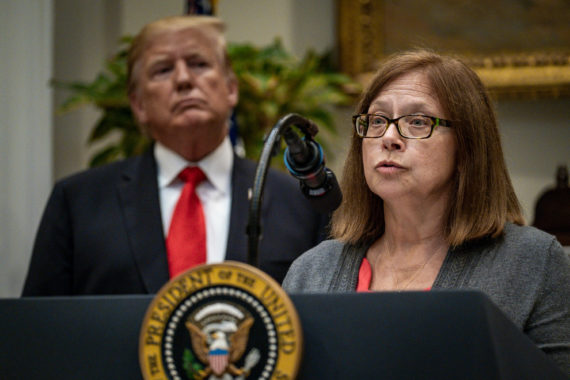
Death of D. J. Jaffe Leaves A Hole For Those Pushing A Serious Mental Illness Agenda
(11-09-20) What direction will the Substance Abuse and Mental Health Services Administration (SAMHSA) take after a new assistant secretary is appointed?
The Biden transition team already is in the process of compiling a list of potential candidates to replace Dr. Elinore McCance-Katz, Secretary of Health and Human Services for Mental Health and Substance Use.
Under her leadership, serious mental illness (SMI) has been a priority at SAMHSA following a predecessor who ignored it for years.
President Trump nominated Dr. McCance-Katz in May 2017 but she didn’t take office until late that fall after Senate confirmation. The Biden team intends to move much quicker in naming her replacement, I’ve been told, hoping to have a new assistant secretary in place by April.
Some hoped Dr. McCance-Katz would be asked to continue, but her comments during a recent Health and Human Services podcast doomed her. She was accused of promoting Trump’s political agenda rather than backing science, and she drew additional criticism after she accused the media of being dishonest about reporting COVID. Shortly before the election, she moved to clarify her remarks in an interview with MedPage Today but the political damage already had been done.
In a 2018 year-end blog, I named her the most influential player in mental health for that year. Although I didn’t initially back her for the job (I’d recommended Miami Dade Judge Steven Leifman), Dr. McCance-Katz graciously appointed me to the federal panel that advises Congress about mental health matters (ISMICC) and I was invited to tell my family’s story to HHS Sec. Alex Azar so he could hear first-hand about barriers that parents face trying to get meaningful help for a loved one.
Dr. McCance-Katz immediately set out to change SAMHSA’s course.
The agency didn’t employ a single psychiatrist at one point before Dr. McCance-Katz took charge. It issued a three-year plan that never mentioned bipolar disorder or schizophrenia.
Dr. McCance-Katz was so disgusted by what she observed when she worked as SAMHSA’s first chief medical officer that, upon resigning, she published a 2016 article in Psychiatric Times that accused her former employer of harboring “a perceptible hostility toward psychiatric medicine” and questioning “whether mental disorders even exist- for example, is psychosis just a “different way of thinking for some experiencing stress?”
Dr. McCance-Katz pushed an agenda that called for greater use of Assisted Outpatient Treatment, waivers for states of the IMD exclusion, and tightened what constitutes an evidence based practice that made it eligible for federal funding. (Before she took charge, critics claimed SAMHSA used little or no real evidence when it declared a practice evidence based.) She oversaw a streamlining of the evidence based review process so federal funds could be released more quickly to programs. SAMHSA received budget increases under her leadership and she launched a national effort to create real-time bed registries to identify available beds and post crisis follow-up services for those living with serious mental illnesses.
Her actions garnered distractors. Not everyone wanted a shift at SAMHSA.
She stopped federal funding of a national Alternatives Conference, which provided diverse perspectives on mental health – including speakers who voiced anti-psychiatry views – and sidelined Paolo del Vecchio, director of SAMHSA’s Center for Mental Health Services (CMHS) who was an influential peer champion after he reportedly undermined her policy changes. Those moves were viewed as a shift away from peer support and the recovery model of treatment in favor of the traditional medical model and paternalism. Ironically, Dr. McCance-Katz provided more funding for peer related services during her term than her predecessor.
Dr. McCance-Katz was nominated by President Trump after her candidacy was strongly supported by Dr. E. Fuller Torrey and D. J. Jaffe.
Jaffe and his book, Insane Consequences: How The Mental Health Industry Fails The Mentally Ill, were embraced by House Republicans and the Trump Administration, even though Jaffe was a self-described liberal. Last year, he spoke at The White House Summit on Mental Illness along with Dr. McCance-Katz. Before that, he played a key role in helping U.S. House passage of the Helping Families In Mental Health Crisis Act, which was later folded into the 21st Century Cures Act. He capitalized on his connections with the Manhattan Institute, a conservative think tank with strong Republican ties, to lobby for government support of AOT, redoing HIPAA, and eliminating the IMD exclusion.
Jaffe’s influence was not limited to Republicans. His fingers were all over an initial draft of a mental health platform issued by then-candidate Kamala Harris, now vice-president elect. In an opinion piece published in The Hill newspaper entitled: Kamala Harris dropped out, but let’s keep her mental health plan alive, he wrote:
It’s a shame that Sen. Kamala Harris (D-Calif.) dropped out of the Democratic presidential primary. Her mental health plan demonstrated the triumph of science and compassion over political correctness and wishful thinking. If adopted it could improve the quality of life for the seriously mentally ill and the communities in which they live. The remaining candidates and the Democratic National Committee (DNC) should include Harris’s proposals in their 2020 platforms.
Jaffe’s death in September from cancer has been a huge loss for those who wish to keep a national focus on serious mental illnesses.
The question now is who will continue that crusade?
His mentor and close friend, Dr. Torrey, continues to be a tour de force despite his age and health problems. We can expect Dr. McCance-Katz to continue to speak out after leaving office. The loss of Jaffe puts more pressure on John Snook, executive director of the Treatment Advocacy Center, which Dr. Torrey founded. I would expect Snook and Dr. Torrey to use their connections to influence the Biden transition team.
A recent profile of Dr. Torrey written by Emily Kubera published by TAC last week entitled: The Pugilist cited an example of the now 82 year-old psychiatrist’s continued political prowess through TAC.
The National Institute of Mental Health (NIMH) had just released its five-year strategic plan in December of last year. In response, Dr. Torrey and the Treatment Advocacy Center wrote a thorough – and devastating — analysis of how this plan would fail people with severe mental illness. But Dr. Torrey didn’t stop there. Next, he mobilized the public to submit their own reactions to NIMH’s plan. “Given the fact that the last new psychiatric drug for psychosis was clozapine, which was approved 30 years ago, the time is long past due when the NIMH should undertake an aggressive search for better drugs,” he wrote in Treatment Advocacy Center’s May 2020 Research Roundup.
NIMH had expected only a few hundred responses to its strategic plan. Instead, the federal agency received over 6,000.
You can expect those who oppose Dr. Torrey and TAC also to be lobbying Democrats to appoint a candidate willing to reverse many of Dr. McCance-Katz’s policies.
(Read the complete article entitled The Pugilist about Dr. Torrey here.)

TAC photo: Dr. Torrey in his garden



